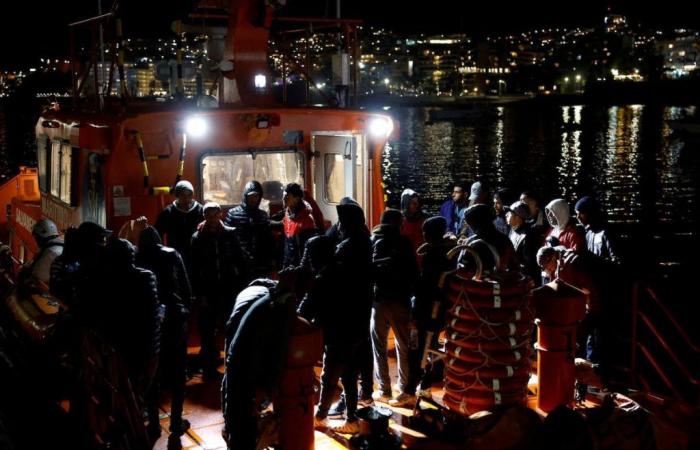Saturday, June 15, 2024, 08:16
Involved in the controversy over the number of migrant minors that in a mandatory distribution would correspond to La Rioja (285 according to what El País recently published, citing sources from the Ministry) the truth is that this community is the one in which there are the fewest registered, not only in absolute terms, but also in terms of its population. Without a doubt, the Canary Islands, Ceuta and Melilla are at the forefront of saturation, but any other territory has a higher proportion of unaccompanied children and adolescents.
Cantabria, for example, with 591,004 inhabitants does not double the population of our community and yet triples the number of menas. Neighboring Navarra doubles La Rioja in residents and multiplies it by 10 in migrant minors and this is the case with the majority of the regions.
Precisely, this would be one of the parameters that would be taken into account when calculating the distribution of migrant minors for which, informally, rather than officially, -no one has transferred the figure to either the regional Executive or the Government Delegation – 285 would arrive in La Rioja. That is, the previous effort in fostering would have a specific weight in the legislative reform that the central Executive and the Canary Islands have been working on for months to, precisely, force the territories to distribute the young people from areas with overwhelmed healthcare resources, such as the Canary Islands and Ceuta.
The reason for the low number of menas, – today there are 12 – always compared to the rest of the regions, has to do, according to the Minister of Health and Social Policies, María Martín, with the limited residential resources. “We have the apartments we have,” she says. In total, 135 places “with a high saturation” although, as detailed by the general director of Social Services, Marta Gómez, the Executive is working on expanding the places.
Until now, the response plan has been agreed upon with the autonomous community and depending on the resources and the population “you accept a number and discuss it with the Ministry.” Now it remains to be seen what will happen in the future with the legislative reform of the Immigration Law to distribute minors in solidarity throughout the territory, taking into account that the Canary Islands have an emergency situation with more than 6,000 minors currently being welcomed.
It would be a pre-agreement that the Government of La Rioja was aware of half an hour before the Sectoral Conference was held last Tuesday, on Saint Barnabas Day, with the Minister of Youth and Children, Sira Rego, in which to address the solidarity and voluntary distribution of 400 migrant minors agreed upon two years before, but which had not yet materialized. In this distribution, La Rioja assumed 4 young people of the total.
Just then the Minister of Territorial Policy and Democratic Memory, Ángel Víctor Torres, in a video message celebrated the pre-agreement, although he did not explain what it consisted of. That announcement blew up the scheduled meeting of the communities with the minister and stopped the already closed referral pact. Now, Rego promised to summon them to a new sectoral meeting as soon as possible, which will likely be held in the Canary Islands and which Minister Torres would also attend.
In La Rioja, the figure that would supposedly correspond to these binding transfers is “nonsense,” says Martín, basically because neither the resources nor the population are taken into account and “they must be cared for in a dignified manner, which is what all the communities are saying,” says Martín. So, firstly, they will study this mandatory agreement and, secondly, they will take it to the Constitutional Court “because the exclusive competence lies with the autonomous communities,” explains the counselor.
“These distributions will have to be according to the reality of each region, insists Martín, for whom “there are a thousand ways to solve these emergencies other than the State getting rid of a problem by calling the communities unsupportive.” One of them, and this has been proposed to the Ministry, is to enable buildings owned by the central government, especially the Ministry of Defense, to care for minors.
Get wet, in Congress
The Government delegate in La Rioja, Beatriz Arráiz, insists that the figure would in no case be closed. Yes, there is a principle of agreement that consists of modifying the Immigration Law, which means that the processing will have to continue in the Congress of Deputies and “that is where the political groups will have to negotiate which are the criteria under which “They are going to distribute the minors and therefore that is where the parties are going to have to get wet.” “This is the situation,” she maintains, “everything else is to generate controversy around a delicate issue.”
The criteria that will govern the distribution “will come at a later time” and “will be the product of a negotiation in which the groups will have to decide.” And in this distribution, although the competition lies with the communities, Arráiz remembers that they will have financial help from the State. “We all have to work in solidarity in this sense because ignoring a problem that exists on our borders is totally absurd, the problem is in our country and we must face it.”
€2/month for 4 months
Are you already a subscriber? Log in






